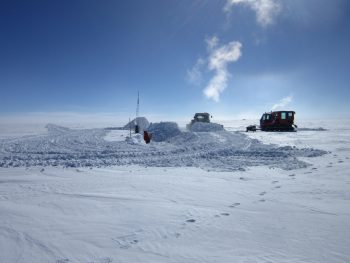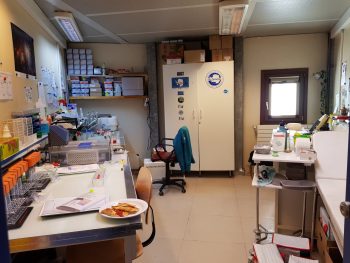
To escape the hectic pace of the station it is best to join an expedition. The excavation of the instruments keeps us pleasantly warm throughout the afternoon.
Credits: ESA/IPEV/PNRA–C. Possnig
Dr. Carmen Possnig is the ESA-sponsored medical doctor spending 12 months at Concordia research station in Antarctica. She facilitates a number of experiments on the effects of isolation, light deprivation, and extreme temperatures on the human body and mind. In the following post, Carmen discusses life in Antarctica.
“The coldest winter I’ve ever had was a summer in Antarctica”
Quote freely adapted from what is often wrongly attributed to Mark Twain. Just a few months later I can no longer truthfully say that.

Frozen breath
Credits: ESA/IPEV/PNRA–A. Kumar
A summer in Antarctica is already an extraordinary experience. Our station, intended for about 16 people, is populated with up to 72 people at times (which is still little, as I am told). Additional sleeping places are available in the nearby Summer Camp or in tents. During meal times you notice how many people are actually here; in the living room you have to fight for a seat if you want to enjoy your coffee. The noise level is also correspondingly high, French and Italian mix in my ears, plus the clattering of table football and at times wild music.

The ESA laboratory. On the bottom left a plate of focaccia, which our chef regularly distributes with concern for our glucose levels.
Credits: ESA/IPEV/PNRA–C. Possnig
My laboratory is located on the third floor of the quiet tower. The flow cytometer hums happily, the water gently bubbles, all languages are transformed into a background noise – the perfect retreat.
The summer with the daily 24 hours of sunshine, the comparatively mild temperatures (-20° to -40°C) and the fun-loving hustle and bustle is on the one hand a great time: there is enthusiasm in the air, everything is new and unknown, everyone has a lot of work, but this is fun. For two of my experiments the responsible persons came from Europe to train me in the handling of the laboratory work and the Soyuz capsule simulator.
The weekends are urgently needed for recreation. The parties seem more intense and exuberant than we would have celebrated them in Europe – maybe it’s the wild environment, maybe the urge to let go and forget the hecticness of the week. Maybe it also due to the lack of oxygen that makes dancing much more strenuous.
To read Carmen’s adventures at Concordia in German, see her personal blog.




Discussion: no comments